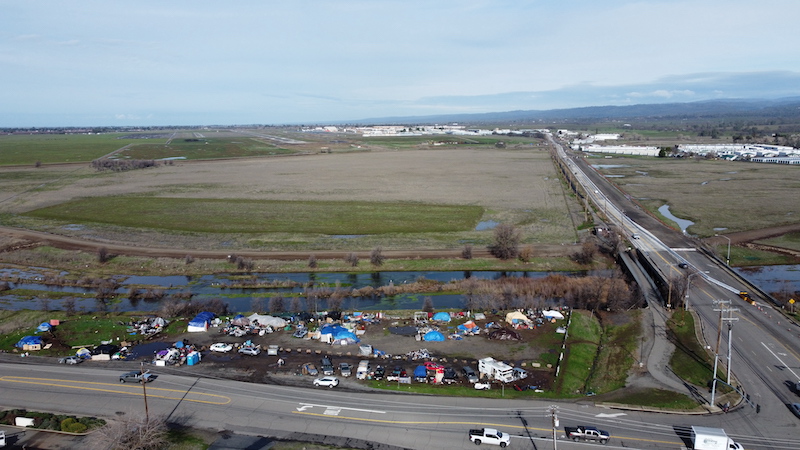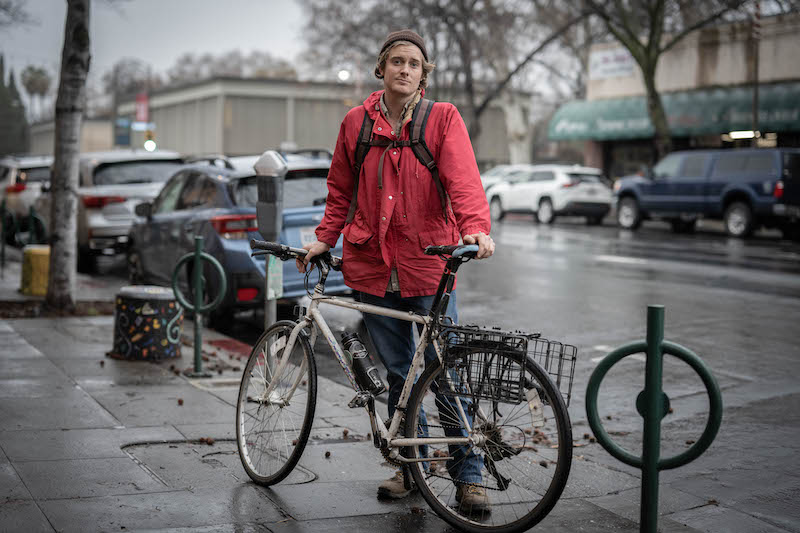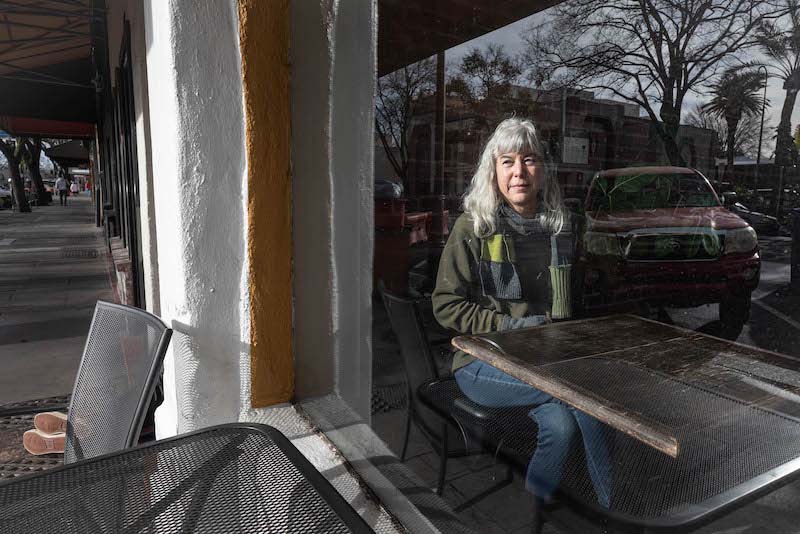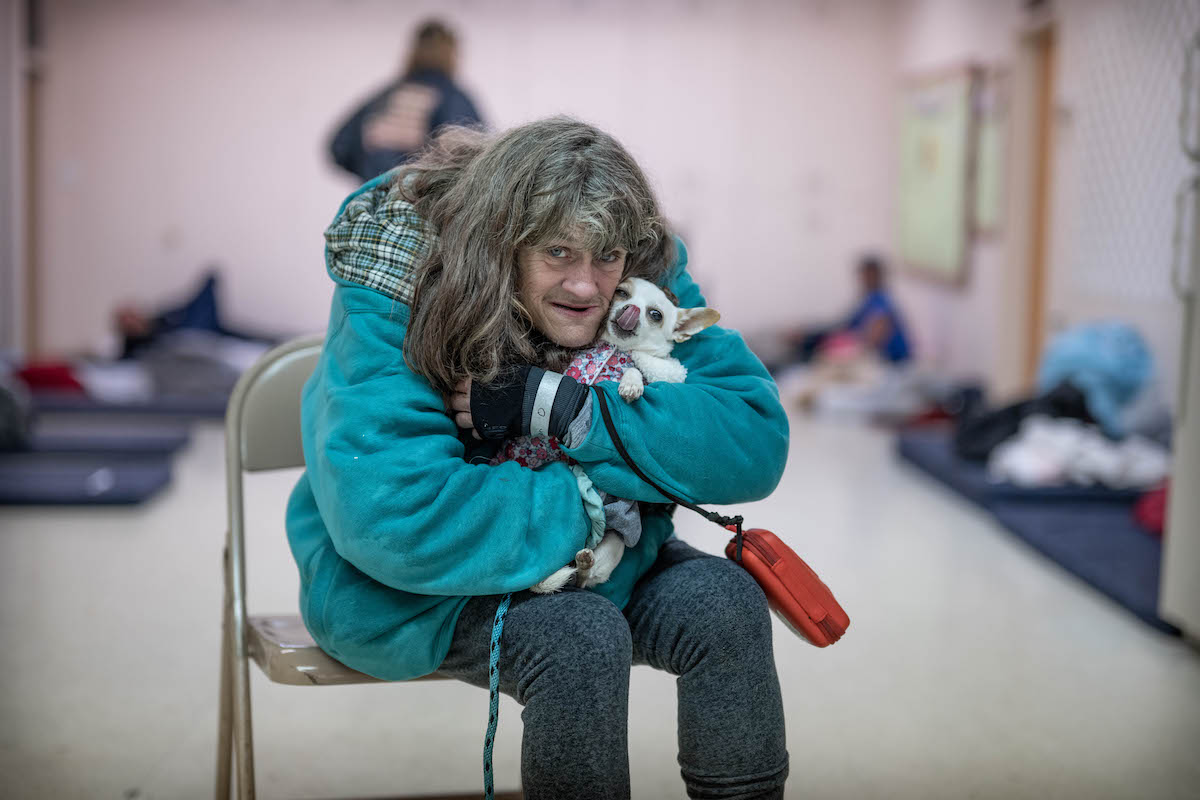CHICO, Ca. – The Eaton-Cohasset homeless encampment sits on the northern edge of Chico, a semi-rural college town about 90 miles north of Sacramento. It’s a motley assortment of weathered tents, a couple of dumpsters and a port-o-potty that juts up from the muddy gravel.
With hate crimes targeting racial, religious, and sexual minorities on the rise nationwide, residents here say they’re being targeted for another reason: because they’re homeless.
“There’s some guy who drives around with a loudspeaker and a mask on saying, ‘Get out of Chico or get killed,’” says Jimbo Slice, 29. A native of Paradise, about 12 miles east of Chico, Jimbo—he declined to give his last name—is among the thousands who were left homeless by the 2018 Camp Fire that devastated the region. “He drove by three times yesterday.”
For camp residents the threats feel all too real.

On several occasions last October and into November, the two dozen or so people who live here were sprayed with air-gun pellets fired from a passing vehicle. Charles Withuhn with the North State Shelter Team, which provides mobile showers to Chico’s unhoused, says four people were hit in those incidents.
“In the early evening, before dark, a police car would go by. A few minutes later, a compact car passed with the passengers shouting profanities (and releasing) high-powered automatic pellet fire,” residents told Withuhn.
The year prior, a homeless man at the Teichert Ponds camp nearby was shot and killed and another injured by two teens. The judge in that case dismissed the charges, ruling the shootings were done in self-defense before any defense evidence was presented.
Phil, who is 56 and has lived at the Eaton-Cohasset camp the past two months, says being homeless in Chico is like having a target on your back. He points to his bicycle, which leans against the low-slung barbed wire that serves as the camp’s fencing. “If you’re on a bike with a backpack in this city, you’re a target.”

Experts in hate crime legislation say the original intent of such laws was to protect groups identified by specific, immutable characteristics such as race, religion, or sexual identity. A person with long experience in the field who spoke on background said there is a heated debate now over whether to extend such protections to other classes, including the homeless.
One such effort in 2019 failed to make it out of committee hearings. Opponents at the time argued hate crime laws would not deter attacks against people experiencing homelessness. More recently they contend that extending such protections to the unhoused would dilute the efficacy of hate crime laws at a moment when hate crimes and related incidents targeting racial, ethnic, and gender groups are spiking.
But with California home to nearly a third of the nation’s unhoused population, and with solutions seemingly non-existent, frustration is growing and, in some cases, turning into violence directed at an already marginalized and vulnerable group.
In Chico, homeless advocates say social media and political rhetoric are adding fuel to the fire, painting the homeless as a threat to public safety at a time when some city leaders seem bent on attracting work-from-home urbanites who want to move out of larger cities and back to smaller town life.
There’s a “constant group of people that have nothing but negative things to say on social media, and when that is all the public is ingesting it translates to a hateful attitude toward people experiencing homelessness,” says Hilary Crosby, executive director of Safe Space, which provides overnight shelter for unhoused people in Chico.
The latest point-in-time count from 2019 puts the number of homeless in surrounding Butte County at 1,125, though many here say the actual number is likely far higher. New figures are expected in March.
Addison Winslow is a Chico native and the lone progressive voice on the City Council. “The right has spun a narrative that taps into that grassroots resentment of homeless people” to create an atmosphere that is growing increasingly hostile and potentially dangerous for the unhoused. The violence is becoming “mainstream,” he adds.

Phrases like “toxic compassion,” meanwhile, are being bandied about by those on the right to justify the denial of resources to people on the street.
Sue Hildebrand is a local activist and radio personality. In early December she was physically assaulted by a homeless woman while running errands. “As I relive it, there were about four or five seconds where I really thought she would kill me,” recalls Hildebrand, pulling back her hair to reveal patches of raw skin where her hair had been yanked out.
But instead of turning on the homeless, Hildebrand says her experience is an example of why the city needs to do more to provide essential services—including mental health resources—to this population.
“The lesson learned is not, don’t help people,” she says. “The lesson learned is, we are not helping people and that is making our community more dangerous.”

Back at the Eaton-Cohasset camp, one of three sanctioned by the city, conditions feel increasingly hopeless.
“Every day these large trucks drive past blaring their horns, screaming at us,” says Phil, who jokingly suggests putting up a sign along the fence that says, “Honk if you support homelessness.” “I bet the honking would stop,” he laughs, before his mood once again turns grim. “I’m worried they’ll form vigilante groups one of these days.”
It’s early evening at a Safe Space shelter near downtown. Inside, Colleen Olson (pictured at top) sits on a metal folding chair curled around her chihuahua. Born and raised in Chico, Colleen recently lost her RV after it was towed for being illegally parked. She’s struggling to raise the money to get it out of impound.
In a flurry of words, she relates one tragedy after another, ending with the death of her boyfriend, the same individual she says who was killed in the shooting at Teichert Ponds.
Asked what has changed about Chico since her childhood, she doesn’t miss a beat. “This is not the town I grew up in. It’s more hateful.”
Additional reporting by Leslie Layton at chicosol.org. Photos by Manuel Ortiz.
EMS’ Stop The Hate initiative is made possible with funding from the California State Library (CSL) in partnership with the California Commission on Asian and Pacific Islander American Affairs (CAPIAA). The views expressed on this website and other materials produced by EMS do not necessarily reflect the official policies of the CSL, CAPIAA or the California government. To report a hate incident or hate crime and get support, go to CA vs Hate.





